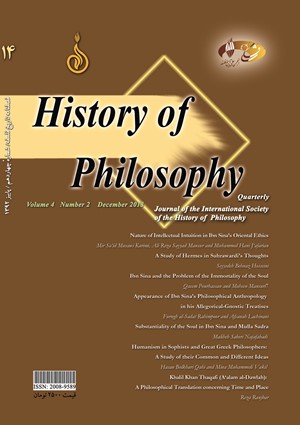Substantiality of the Soul in Ibn Sina and Mulla Sadra
Subject Areas : Geneology of philosophical schools and Ideas
1 -
Keywords: Ibn Sina the soul Mulla Sadra individuation of the soul substance grades of the soul ,
Abstract :
One of the important problems of Islamic philosophy is the demonstration of the substantiality of the soul. In spite of their agreement concerning the substantiality of the soul, Mulla Sadra and Ibn Sina have some basic disagreements in the interpretation and explanation of this principle. The extent of these disagreements has also stretched to some critical issues such the explanation of the soul, its changes, and its relationship with other faculties, which are the focus of this paper. According to Ibn Sina, possible beings consist of two analytic-rational components, that is, existence and quiddity. He also maintains that the source of the division of categories, under which substance and accident fall, is quiddity itself. The difference between substance and accident also lies in the fact that existence is substance by itself, and existence is accident through the other. Therefore, the soul is an immaterial substance that performs voluntary administrative acts and perceives universal affairs. It has some branches or faculties through which it carries out its acts. In this approach, the differences among human souls, from their highest to lowest levels, are rooted in accidents, and no change occurs in their substance. In Mulla Sadra’s view, too, accident has no independence before substance, thus it is a dependent truth enjoying an existence depending on the other. Nevertheless, based on the principle of the principiality of existence, the criterion for individuation is existence; an existence which underlies the individuation of a subject and is the referent for substance itself and a referent for all accidents. In other words, it is a single existence that is a referent for man with various accidents. The soul is a substance commensurate with existence and enjoys an essential and graded existence the accidents of which are considered to be the grades of this truth. The soul’s faculties are its modes and grades, and the perfections attained by the soul originate in its unity with perceptive forms.
آشتياني، سيد جلالالدين، شرح حال و آراء فلسفي ملاصدرا، نهضت زنان مسلمان، تهران، چ 1، 1360.
ابنسينا، الاشارات و التنبيهات، شرح خواجه نصير طوسي، تحقيق سليمان دنيا، بيروت، لبنان، 1992.م.
ابنسينا، الشفاء، الهيات، تصحيح و مقدمه ابراهيم مدكور ، مصر 1405.م.
ابنسينا، رسائل، قم، انتشارات بيدار، 1369.
ارسطو، درباره نفس، ترجمه عليمراد داوودي، تهران حكمت، 1369.
افلاطون، مجموعه آثار، ترجمه محمدحسن لطفي، تهران خوارزمي، 1337.
اكبريان، رضا، «جوهر از ديدگاه ملاصدرا»، مجله مطالعات و پژوهشهاي دانشكده ادبيات و علوم انساني، ش 51، ص1388.
حسنزاده آملي، حسن، معرفت نفس، دفتر دوم، تهران، علمي فرهنگي ،1362.
سهروردي، مجموعه مصنفات شيخاشراق، تصحيح و مقدمه هانري كربن و سيد حسين نصر، تهران، انجمن فلسفه ايران، ج 1، 1355.
طباطبايي، محمد حسين، نهاية الحكمه، قم، مؤسسه نشر الاسلامي التابعه لجماعه المدرسين، 1362.
مصباح يزدي، محمدتقي، شرح جلد هشتم الاسفارالاربعة، بكوشش محمد سعيدي مهر، قم، انتشارات اسلامي، 1375.
ملاصدرا، الحكمه المتعاليه في الاسفار الاربعة، تصحيح، تحقيق و مقدمه علياكبر رشاد؛ باشراف استاد سيدمحمد خامنهاي، ويراستار مقصود محمدي، تهران، انتشارات بنياد حكمت اسلامي صدرا، 1383.
ملاصدرا، الشواهد الربوبيه في المناهج السلوكيه، تصحيح و مقدمه سيد مصطفي محقق داماد؛ باشراف استاد سيد محمد خامنهاي، تهران، انتشارات بنياد حكمت اسلامي صدرا، چ 2، 1383.
ملاصدرا، الحكمةالمتعالية في الاسفار الاربعة، ج 9، تصحيح، تحقيق و مقدمه رضا اكبريان، باشراف استاد سيدمحمد خامنهاي، ويراستار مقصود محمدي، انتشارات بنياد حكمت اسلامي صدرا، چ 1، 1382.

